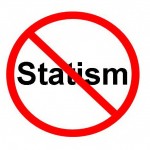An Introduction to the Non-Aggression Principle
This is the first post in a series, in which I will define and apply the Non-Aggression Principle to issues of moral and ethical confusion.
The NAP in three easy sentences:
- You have the right to your life, liberty, and property.
- You do not have the right to aggress against the life, liberty or property of another.
- You cannot delegate a right that you do not have.
Steps one and two are easy. In fact, it is the general philosophy that the vast majority of people operate under in their day-to-day lives and in their interaction with others.
Step three is where the vast majority of people fail, due to their indoctrination into the immoral idealogy of statism. The very idea of government is a violation of the Non-Aggression Principle, and an individual’s belief in government is the root of the personal moral and ethical conflict he faces when advocating government action.
Government is the Means by Which we use Violence Against our Fellow Man.
If you don’t have the right to use violence against your neighbor’s life, liberty, or property then you cannot delegate that right to another person, nor a group of people calling themselves “government.”
An Example
If you don’t like the fence your neighbor is putting on his property, you can either use persuasion and tact to express your opinion and try to get him to change his mind – or perhaps get several of your other neighbors together who share your concern and address him as a group. If it’s that important to all of you, perhaps you can even offer to contribute funds to help him pay for a fence that is more to your liking.
What if he still refuses, and proceeds with his plans? Well, you could march right over to his house, call him out, and beat him profusely until he agrees to do things your way. Of course, that would be immoral and a violation of the Non-Aggression Principle – and, more importantly, your actions will have consequences. Perhaps you wind up on the short end of the stick, and find yourself bloodied in the street picking up your teeth. Or perhaps he gets you back later, or maybe the rest of your neighbors come after you for using violence against him.
The point is that there is a reason we don’t aggress against our neighbors as a general rule. We understand that it is immoral and unethical, and we understand that there are usually consequences for our actions.
So this is where step three comes in: Instead of aggressing against him ourselves, we go to the local shop-of-thugs calling themselves government, and use them to go after our neighbor. If there isn’t already a fencing ordinance telling him what he can do with his property, maybe we can persuade the band of thugs to pass one. Then they’ll go to his house as our “representative” and demand that the neighbor do with his property as we wish him to do, irrespective of his property rights. What are the consequences if he refuses? Threats of fines and imprisonment. And what if he should stand his ground, assert his property rights, and demand that he be left alone? The local thugs will send their enforcement arm to his property, and if he should resist them and defend his property, they will bludgeon him with their batons, administer him 50 thousand volts of electro-shock with their portable torture devices, or – ultimately – kill him should he have the temerity to fight the aggressors.
All of this because we don’t respect the property rights of our neighbors, and we are willing to use force against him to make him do as we would like him to do with his property.
You don’t have the right to violate his property, you don’t have the right to use violence against him, and you can’t delegate a right that you don’t hold yourself. You cannot appoint a representative to do your violence for you, it is just as immoral as doing the violence yourself.
Indoctrinated with 13+ years of immoral statist idealogy, most individuals cannot accept the third statement of the NAP – it slams into their own cognitive dissonance, that self-protective reflex that protects them from being wrong, that tells them that the state is not violence, that the state is “us” and it acts in “our” best interests.
The fact is that the state is nothing more than a monopoly on the use of violence. It is the gun in the room that no one wants to acknowledge. It is the means by which we use violence against our fellow man.
Understanding and embracing the Non-Aggression Principle is the key to liberty and a peaceful, prosperous society of individuals acting in their own interest while respecting the rights of others. I will be writing a series of entries on the NAP, and it has its own category link in the left-hand navigation.
